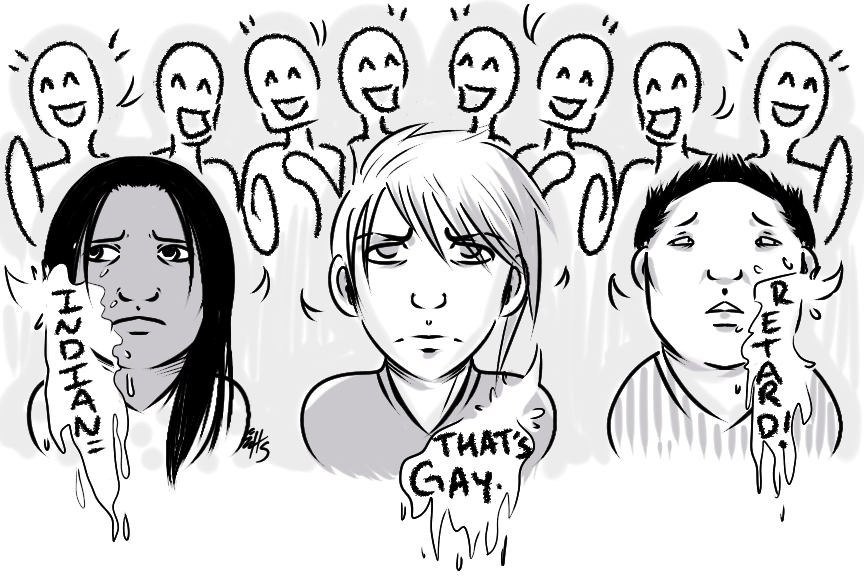Most of the time we don’t mean any harm. It’s more like a slip of the tongue. We are talking with a close group of friends and are trying to get some point across in the quickest and most digestible way and we say something we probably don’t mean.
Political correctness is a strange monster to tackle.
I wrestle with it constantly. Do I refer to someone as black or African-American? We don’t say, European American, we say white. Africans aren’t necessarily black and black people aren’t necessarily African-American. What if someone has a preference for one or the other?
My friends have sometimes complained about my forcefulness in avoiding the use of derogatory terms even when they are thrown around with no foul in mind.
“That’s gay,” coming from the lips of one my friends doesn’t necessarily originate from a place of personal homophobia, but rather ebbs out as an easy way to perpetuate the habit of using a common word rather than thinking of the weight the word may carry.
“That’s not what I meant,” they complain. “You know I don’t mean it like that.”
But it’s the burden we must bear because we know better.
It’s like the time your younger brother broke your mom’s favorite vase, but you were the one who got in trouble for not watching him more closely.
I suppose sometimes it doesn’t really matter all that much, and I suppose sometimes no harm means no foul. But sometimes we should be concerned with what we spew out in the perhaps off chance there is harm.
I’m not going to lie; hypersensitivity to these types of issues can be irritating and taxing. It’s more work to avoid using common phrases that already have the connotation you are after than to just give in and be satisfied because you know you didn’t mean any harm.
It isn’t enough, though, to use a word or phrase simply because you know you didn’t mean any malice.
What happens when we continue to use these words and phrases is that we project an image that we can say or do whatever we want as long as there are no bad intentions involved, and that’s simply just not true.
When we use terms in the improper fashion, we are not only continuing the trend of using improper terminology, we are refusing to take a stand.
Every time we don’t correct ourselves (or others), and let something slip instead, we imply that the matter is not important enough to say something.
If ignorance is bliss, then knowledge is power, and with power, we all know, comes responsibility.
If we truly believe we know better, it is our duty to exemplify that.
Midget, cripple and spic can be used with pretty benign intentions, but when we fail to avoid using them, we fail to remember their origin, what they stand for and what they may represent to a certain group.
We may say it’s not a big deal because those around us don’t mind and don’t take it in a harmful light, but if we pride ourselves in knowing the truth, we should make the attempt to be more creative with our word choice and more thoughtful of the weight words can carry.
On our shoulders is the responsibility to struggle with what is OK and what is not. Those who know the most must be the ones who lose sleep over tiny things, the ones who care maybe too much, and the ones who annoy their friends until they stop using “gay” incorrectly.
There are far too many words in our language for it to be excusable to limit ourselves to the lazy and overall damaging words we find comfortable and within reach.
I don’t remember where I read it or maybe I made it up, but the following thought comes to mind: “The life we construct every day is the house in which we live.”
What we choose to throw out into the mass of things swirling around in the universe is what we must live in today and tomorrow and the next day.
Even if it’s confusing, even if it’s sometimes unnecessary, even if no one cares, it’s for the best that we wrestle with political correctness in the hopes that one day we no longer have to worry about it.












